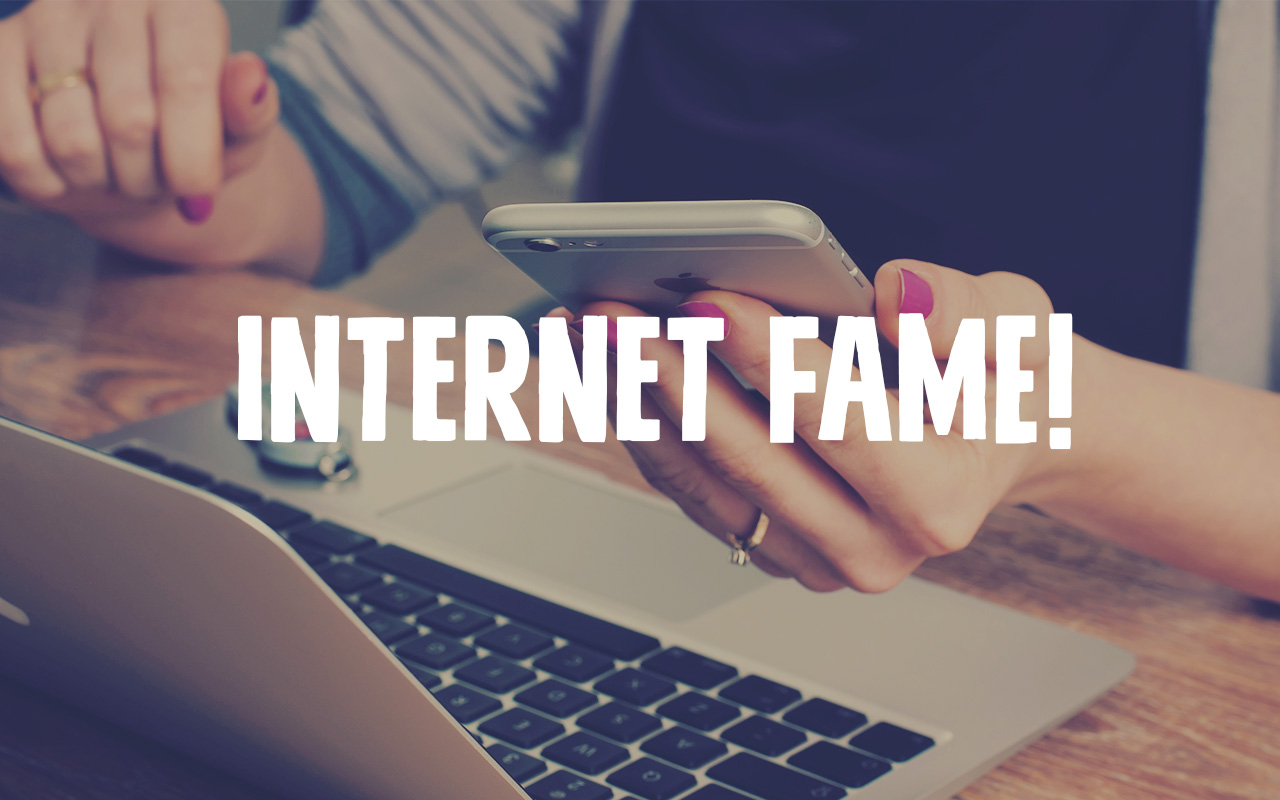
Internet Fame
The economics of the internet mean that you can become a fleeting overnight sensation (see: 15 minutes of fame), but for the wrongs reasons. Ask any entrepreneur, internet celebrity, thought leader, social psychologist how to become an overnight sensation, and they will tell you it takes 10 years. I recently made an appearance on a reality show on TV. I learned a lot about internet fame, being thrust into the public spotlight, and dealing with criticism in the ‘fallout’ of the show. The slot was 15 minutes, so you could in fact say, I had my 15 minutes of fame. Something I don’t want, and also being associated with being on TV. “You’re that guy from [TV show]”.
Whilst on the show, I talked about my background and what I do for a living, ie. Design and Handlettering. It was only afterwards that I realised that people were not going to associate my living with me when they first met/heard of me. That’s a secondary thought. When you first meet someone who you recognise, the first thing you think of when you see them is, “where did you see them before?” It’s not, “who is this person?”.
This can be a problem if you are building an audience online through your passion, hobby, profession etc. The world is connected online, so if someone wants to find you, they are going to find you. Think of your Instagram, you’re trying to build an audience for your nature photography, it’s curated solely by this work. Suddenly, after getting attention through this other thing where it happened to be seen by a few thousand people. You start to get a lot of traffic, new follows, a flurry of likes and comments. Is this because they like your work, or because they recognise you from this other thing. It’s hard to measure, there is a chance that these hundreds of new followers happen to like your specific nature photography, but more than likely it’s because of the other thing. This is a false audience.
The point of building an audience is not to have the most people following you, it’s to have a number of people who find value in your work and like it for what it is. An audience is a community. People to talk to, build relationships with, help each other. And the best leaders interact with their audience around their work. How many people who you follow interact with their audience in the comments section of their work?
Being thrown into the public spotlight for something you have done but without want of an audience for that thing can be difficult if you’re building an audience for something else. For your new audience and for the existing one. It creates a conflict. Your existing audience knows you for one thing, and another group of people know you for the thing you don’t want.
It’s nice to be recognised, but it’s nicer to be recognised for the thing you want.
With new-found ‘popularity’, brings new people, both good and bad. People are going to criticise, it’s the nature of human behaviour. To find fault in another helps bolster your own insecurities. But, when dealing with online abuse, remember, for every 100 silent admirers, you get 1 outspoken detractor. It seems worse when you see the detracting messages, but when you remember that there are more admirers than haters, you start to feel better. It’s only haters that feel so compelled to detract they act on it. The anonymity of the internet allows people to say what they want without fear of consequence. People don’t say these things in real life, they think them. Either to themselves or to their friends. The average person and vast majority would never act upon their thoughts given the opportunity in real life.
People don’t like confrontation and conflict. This is why Twitter is like stand-up comedy for shy people.
This is a good thing, for the thing you did (ie. the TV show), but even more so if you get criticism from the thing that you are building an audience with. It means your message is strong. It means you resonate with someone enough to challenge their views on a topic. For anyone to lash out in retaliation shows their own insecurity with their views. A person who knows their values can debate them to you confidently and calmly.
When people criticise you, they are not criticising you as a person, they are criticising the role you’re playing, the character, the persona. A string of characteristics that they can mould together in order to class you as something and pigeon-hole you. People need to be able to assign predetermined characteristics to you so they can put you in a box in their mind, so they know how they can label you. Labels brings about traits, either good or bad. Depending on how they label you this may bring about either social, cultural, or personal prejudices to mind. This is how people find fault with those they do not know.
How can people criticise you otherwise if only for a character that they have created in their mind?
Think about how you act with your family vs. your friends for example. You have different tendencies, you say different things, you act a different way, even if it’s slightly. This is a persona, a way of acting among a certain peer group of what’s expected of you over time. This is the same as how you conduct yourself when you are building an audience for example. You want to create an audience for your work, whatever your passion may be, be it prank videos, lettering artwork, skateboarding tricks. Whatever it may be. You have a persona to the audience on the other side of the screen. Even if it is just small, or you do something a little different to how you would normally act.
This is why stereotypes are mute on individuals. Stereotypes are assigned to a group of people who have a common, specific trait. But that’s a collection of people and not how an individual from that group may act. Groups of people may carry a stereotype, but not an individual. An individual has the capacity to act in a different way. Take the stereotype of the Irish for example; That Irish people drink. This is a cultural trait renown worldwide. There are many people I know who don’t, including myself.
People can only criticise a character of you. Otherwise they don’t know you, your life, or how you conduct yourself in the real world. There is a lot to be said for putting your stock in thinking you know someone’s life from behind a screen.
You follow the people you do because they have similar traits to you, similar views, opinions, values etc. This is how you resonate with people, and this is how you build an audience through resonating with people who are already familiar with the type of person you are. This is a character you have created in an online environment. It is not the real you.
Be tolerant of others values and views. You don’t know their situation or the environment that caused them to adopt these values. It’s none of your business what other people do anyway, especially when it’s for good. What I mean is, if you have a problem with someone who is ‘Internet famous’ for doing the right things, providing value to people and enriching people’s lives. Who are you to say otherwise? When you speak out negatively, you’re only conflating your own insecurity and jealousy.
People don’t like when others get something for nothing, this is a reason why you get haters. Especially in an online world. Haters may think this fame and fortune fell on these creators miraculously, but without knowing the years of planning, hard work and execution to realise this goal of building an audience and becoming ‘Internet famous’. Nobody gets known for nothing.
The shame about producing content and publishing it in the digital age means that it is open to criticism. But think about those who do not create any content at all. It must be around 90%/10%, consumers to producers. I can guarantee you that those people who are criticising are not creating content, let alone creating similar content of the same type where their views on it are not baseless.
Your mindset on content creation completely changes when you’re doing the creating. You’re much more open to the thought process of the creator, having known the hard work that went into it, regardless of the field or profession it’s in. In a way, it’s like a shared experience.
Know your values, know what you stand for, and make a conviction. All that matters is if you’re happy doing what you do.
You are not the result of the work you do, you’re more than that.

